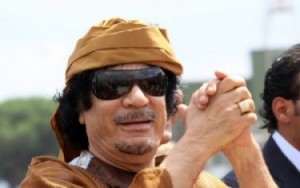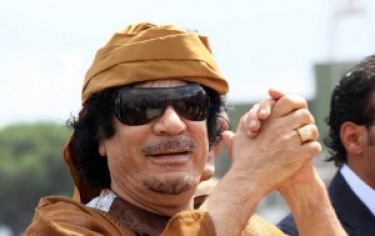The iron-fisted rule of Colonel Muammar Gaddafi, in power for 42 years, has practically run its course as the Libyan rebels have seized the capital city, Tripoli.
That the old-time ruler will step down or face a tragic end is sure to happen, but it is not quite clear what the National Transition Council is going to bring to the oppressed nation.

Gaddafi’s former right-hand man, Abdel-Salam Jalloud, who was the Libyan Prime Minster from 1972 until 1977, and who was an extremely influential figure in the country, believes that the Libyan leader will not be easily toppled.
Jalloud, who fled Tripoli for Tunisia on Friday and defected to Italy, said in an interview with an Italian television channel, “I think it’s impossible that he’ll surrender. He is not like Hitler, who had the courage to kill himself.”
In a new audio message released on Wednesday, Gaddafi vowed “martyrdom or victory” in the battle against NATO and the rebel forces, saying the withdrawal from his Bab al-Aziziya compound in the capital was “a tactical move.”
Western powers have voiced their support for the popular uprising and called for the departure of the dictator.
US President Barack Obama has said Gaddafi’s regime was at a “tipping point” and that the “tyrant” must go.
British Prime Minister David Cameron, likewise expressed his support for the Libyan people and said, “There will undoubtedly be difficult days ahead. No transition is ever smooth or easy. But today the Arab spring is a step further away from oppression and dictatorship and a step closer to freedom and democracy. The Libyan people are closer to their dream of a better future. This has not been our revolution but we can be proud that we played our part.”
Another Western leader joining the league of the supporters was French President Nicolas Sarkozy who warned Gaddafi against “inflicting any more unnecessary suffering on his people by renouncing without delay what is left of his power and by immediately ordering the forces that are still loyal to him to cease fire.”
Meanwhile, NATO Chief Anders Fogh Rasmussen seized the opportunity and said, “Our goal throughout this conflict has been to protect the people of Libya, and that is what we are doing. Because the future of Libya belongs to the Libyan people.”
Also, the European Union spokesman Michael Mann stated the Libyan regime is inching towards its closure and that Gaddafi must relinquish power to avoid further bloodshed.
Despite all the full-throated support the West throws behind the popular uprising in Libya, is it not somehow naïve to think that they might not be pursuing some secret goals in the country?
US Congressman Dennis Kucinich on Tuesday blasted the US government for participating in a military campaign and accused it of “furthering the aims of international oil corporations in pursuit of control over one of the world’s largest oil resources.”
He believes that the five-month-old military intervention in Libya sets a dangerous precedent for unilateral attacks on sovereign nations.
At all events, the future of Libya is shrouded in fraught uncertainty as the fall of the dictator draws near.
NATO says it may wish to contribute to the post-Gaddafi’s Libya. Does it not mean that they wish to poke their nose in the affairs of the country in future and nestle on the eggs they are laying until they are hatched? The influx of foreign forces into Libya under the pretext of establishing security and peace and thereby justifying their long-term presence in the oil-rich country is tantamount to the emergence of another Iraq in Libya and the expropriation of natural resources. In a nutshell, the end product of the foreign military presence will be a war of attrition to be dragged on for years on end.
Further to that, foreign intervention will be a huge roadblock on the path of democracy which is the main concern of the Libyan people.
Instead of rivalry, the Libyan people should unite, take their fate in their hands, shun tribal tensions and usher their country into the democracy they have made supreme sacrifices for.






